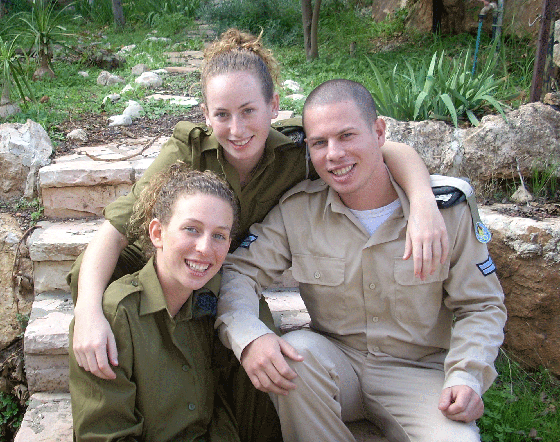By TEDDY WEINBERGER
I have three children serving in the Israel Defense Forces. I am the father of Sergeant Nathan Weinberger (almost 21), Corporal Rebecca Ross (19 and a half), and Private Ruthie Ross (18).
President-Elect Barack Obama has spoken repeatedly of the need to engage young people in service for their country and for the world; in Israel, service is mandatory. Nathan is two-thirds of the way through his required three years of service, Rebecca is halfway through her two years of service, and Ruthie was inducted on Nov. 5.

We moved to Israel from Miami in the summer of 1997. How is it different to live in a country with mandatory military service? As the parent of three soldiers, I am very much touched by the fact that the whole country loves my children. Because service is mandatory, when Israelis look upon my uniformed children, they see not only young people serving their country, but they also see themselves, as well as their own mothers, fathers, brothers, sisters, sons and daughters – who once served, who are serving, or who will serve.
It is because of this, too, that the military’s achievements are naturally experienced as our achievements and its failures as our failures (and oh how difficult it is to admit failure).
The years of regular-army service are so enshrined in Israeli culture that when one speaks of a “soldier” one is referring precisely to this period, though tens of thousands of Israeli men are active in Israel’s military reserves and must report for duty between 20 to 35 days a year, up until they are discharged around the age of 40.
Even your typical hardened Israeli will soften for a soldier. My son Nathan failed his driving test three times; he finally passed on his fourth try – while wearing his IDF uniform.
Rebecca took our car in for its government-required annual testing. She was in uniform. Though she could not find the necessary insurance papers and though a headlight needed to be replaced, she managed to convince the tough mechanics at the testing center that we did have insurance (true), and that they needed to replace the headlight on the spot because she was too busy to return (less than true). The guys got a big kick out of seeing little five-foot-two Rebecca in her uniform. Repeatedly saluting her and saying, “Yes, officer ma’am,” they stamped all the necessary forms and sent her on her way.
For a parent, there is a huge difference between noncombat military service and combat military service. When your son goes into a combat unit (there are almost no girls in these), you can say good-bye to sleep for a few years.
Thankfully, I am not yet the father of a combat soldier (though it’s almost certain that one or both of my youngest two, both boys and both now in high school, will be in combat). Nathan was excused from combat for medical reasons. He is serving in the air force in the south of the country, working in a weapons testing lab and also in the financial office of his huge base.
Rebecca works at a high school for problem children during the day and plays professional basketball at night. (She was awarded “outstanding athlete” status by the army and can thus maintain her basketball career.) Ruthie will be teaching Hebrew to new-immigrant soldiers; she is now in the middle of a 10-week course that will train her for this job.
I think that a big difference between me and my peers in the States, whose children are in college rather than in military service, comes down to pride. I can feel that the whole country is proud of my children, and in turn I am completely and utterly proud of them. Were I in the States, and were my children, respectively, a freshman, a sophomore, and a junior in college, I would certainly be proud of them, but I don’t believe that pride would be the key emotion in my relationship to them. I would be concerned about paying for their tuition and about their future.
After the often tense high school rebellious adolescent years, it’s wonderful to have pride be one’s overwhelming feeling for one’s child. I am proud that when called upon by their country to serve, my children have responded in the affirmative.
***
Teddy Weinberger lives in Givat Ze’ev, near Jerusalem. He writes the “Life in Israel” column for the American Jewish World. This column is from the AJW’s Jan. 2 edition.
Â





















Beautiful article, wonderful family. We need a lot more people like these. I hope this inspires more American families to move to Israel. We need every single one of them